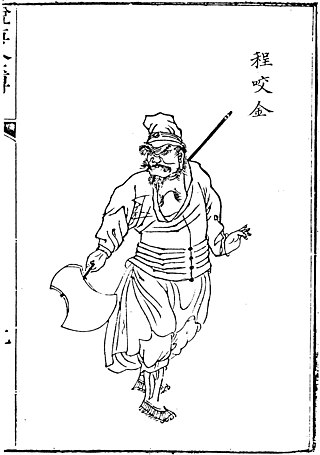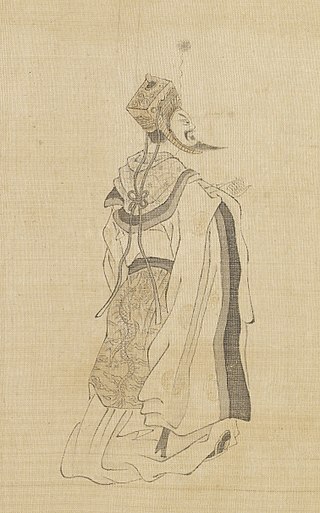Related Research Articles

Wang Shichong, courtesy name Xingman (行滿), was a Chinese military general, monarch, and politician during the Sui dynasty who deposed Sui's last emperor Yang Tong and briefly ruled as the emperor of a succeeding state of Zheng. He first became prominent during the reign of Emperor Yang of Sui as one of the few Sui generals having success against rebel generals, and during Yang Tong's brief reign, he was able to defeat the rebel general Li Mi and seize Li Mi's territory. After becoming emperor, however, he was unable to withstand military pressure from Tang dynasty forces, forcing him to seek aid from Dou Jiande the Prince of Xia. After Dou was defeated and captured by the Tang general Li Shimin, Wang surrendered. Emperor Gaozu of Tang spared him, but the Tang official Dugu Xiude (獨孤修德), whose father Dugu Ji (獨孤機) had been executed by Wang, assassinated him.
Huangfu Song, courtesy name Yizhen, was a military general who lived during the Eastern Han dynasty of China. He is best known for helping to suppress the Yellow Turban Rebellion and Liang Province Rebellion. He was one of three imperial commanders when the Yellow Turban Rebellion broke out, along with Zhu Jun and Lu Zhi. He was known to be a modest and generous person. Lu Zhi was removed from command after the eunuch Zuo Feng (左豐) made false accusations against him; Lu Zhi had refused to bribe Zuo Feng. Huangfu Song, who took over command of the imperial troops from Lu Zhi, continued to use Lu as a strategist and reported his contributions to the imperial court. Thus, in the same year, Lu Zhi regained his post as Master of Writing (尚书).
Yang Yin (楊愔), courtesy name Zhunyan (遵彦), nickname Qinwang (秦王), was a high-level official of the Chinese Northern Qi dynasty.
Yang Tong, known in traditional histories by his princely title of Prince of Yue (越王) or by his era name as Lord Huangtai (皇泰主), also known by his posthumous name as the Emperor Gong of Sui (隋恭帝), courtesy name Renjin (仁謹), was an emperor of China's Sui dynasty. During the disturbances that permeated throughout the Sui state late in the dynasty's history, his grandfather Emperor Yang left him in charge of the eastern capital Luoyang, and after Emperor Yang was killed by the general Yuwen Huaji in 618, the Sui officials in Luoyang declared Yang Tong emperor. However, soon one of those officials, Wang Shichong, seized power, and in 619 had Yang Tong yield the throne to him, ending the Sui dynasty. Soon, he was killed on Wang's orders.
Du Fuwei, known during service to Tang dynasty as Li Fuwei (李伏威), was an agrarian leader who rose against the rule of Emperor Yang of Sui at the end of the Chinese dynasty Sui dynasty. At one point, he had ambitions to take over the region south of the Yangtze River for himself, but he later chose to submit to Tang, receiving the title of Prince of Wu. In 622, fearing that Emperor Gaozu of Tang might doubt his loyalty, he went to the Tang capital Chang'an to pay homage to Emperor Gaozu and stayed at Chang'an. In 624, his general Fu Gongshi rose against Tang rule, claiming to have his blessing, and he subsequently died at Chang'an unexpectedly; after Fu's defeat, Emperor Gaozu, believing him to be complicit with Fu's rebellion, posthumously stripped his honors and made his wife and children servants. After Emperor Gaozu's son Li Shimin became emperor in 626, he knew that Du had not been complicit in Fu's plot, and therefore posthumously restored his honors and reburied him accordingly.

Consort Chen (577–605), born Princess Ningyuan, was a daughter of the Emperor Xuan of Chen and an imperial concubine to the Emperor Wen of Sui, founder of the Sui dynasty.

Zhu Youyuan, was a prince of the Ming dynasty of China. He was the fourth son of the Chenghua Emperor.

Cheng Zhijie, courtesy name Yizhen, better known by his original name Cheng Yaojin, was a Chinese general who served under the emperors Gaozu, Taizong and Gaozong in the early Tang dynasty. His portrait was on display in Lingyan Pavilion along with those of another 23 officials who rendered meritorious service to the Tang Empire during the reign of Emperor Taizong.

The "18 Warriors of Sui-Tang Period" are fictional legendary heroes who lived during the Sui and early Tang dynasties. The concept of the 18 Warriors was first introduced in the traditional historical novel Shuo Tang. The warriors' rankings are based on their martial arts skills and physical strength. Some of them have historical counterparts, such as Qin Shubao and Shan Xiongxin, while others were created by folk story authors, such as Luo Cheng and Yuwen Chengdu.

Zhang Gongjin, courtesy name Hongshen, titled Duke of Tan, was an official and general during the Tang dynasty of China. He played an important role in the Xuanwu Gate Incident in 626 which helped Emperor Taizong obtained the crown. He was a key general of Tang dynasty during the campaign against Illig Qaghan of Tujue. Because of his contributions, he was listed as one of 24 founding officials of Tang dynasty honored on the Lingyan Pavilion.

Qutu Tong, titled Duke of Jiang, Xianbei name Tandouba (坦豆拔), was a general in the Sui and Tang dynasties of China. He was listed as one of 24 founding officials of the Tang dynasty honored on the Lingyan Pavilion due to his contributions in wars during the transitional period from Sui to Tang.

Yin Jiao, better known by his courtesy name Kaishan, titled Duke Jie of Xun, was a general and officer in Sui and Tang dynasties of China. Because of his remarkable contributions during the unification wars of Tang dynasty, Yin Kaishan was listed as one of 24 founding officials of the Tang dynasty honored on the Lingyan Pavilion.

Shan Xiongxin was a general, top warrior and peasant uprising leader during the transitional era between the Sui and Tang dynasties.

Wang Bodang was a general in Wagang Army which rebelled against the Sui dynasty. He is also a highly celebrated and praised figure in Chinese popular culture because of his bravery and loyalty.
Luo Shixin was a general during the transitional period between the Sui and Tang dynasties of China.
Zhang Xutuo, courtesy name Guo, was one of the most celebrated generals during the Sui dynasty. He was best known for his achievements in suppressing rebellions and uprisings during Emperor Yang's reign.
Lai Hu'er, courtesy name Chongshan, titled Duke of Rong, was a general in Sui dynasty of China. He played an important role in the conquest of Chen dynasty in 589, as well as the campaigns against Goguryeo led by Emperor Yang.

Liu Hongji, titled Duke Xiang of Kui, was a general and officer in the early Tang dynasty of China. He was listed as one of 24 honored founding officials of the Tang dynasty at Lingyan Pavilion.
Gou Xi, courtesy name Daojiang, was a Chinese military commander of the Western Jin Dynasty. He came to prominence as a general under the Prince of Donghai, Sima Yue, after he quelled the rebellions of Gongshi Fan (公師藩), Ji Sang and Shi Le. Sima Yue initially valued Gou Xi, but after Gou Xi was constantly antagonized by Yue, their relationship broke down in 310. Gou Xi plotted with Emperor Huai of Jin to overthrow Yue from power, which caused Yue to die of stress shortly after, and Gou Xi being instated to the positions of Grand General and Grand Commander. However, their victory was short-lived due to the Disaster of Yongjia, which saw Emperor Huai and Luoyang’s capture at the hands of Han-Zhao forces in 311. That same year, Gou Xi was captured and later executed by Shi Le.
Ma Sanbao was a Chinese general during the Tang dynasty. He played an important role in the establishment of the Tang dynasty.
References
- ↑ Vol.187 of Zizhi Tongjian indicate that Pei Xingyan and his father were killed shortly before Yang Tong. (王世充以礼部尚书裴仁基、左辅大将军裴行俨有威名,忌之。仁基父子知之,亦不自安,乃与尚书左丞宇文儒童、儒童弟尚食直长温、散骑常侍崔德本谋杀世充及其党,复尊立皇泰主;事泄,皆夷三族。齐王世恽言于世充曰:“儒童等谋反,正为皇泰主尚在故也,不如早除之。”世充从之,遣兄子唐王仁则及家奴梁百年鸩皇泰主。皇泰主曰:“更为请太尉,以往者之言,未应至此。”百年欲为启陈,世恽不许;又请与皇太后辞决,亦不许。乃布度焚香礼佛:“愿自今已往,不复生帝王家!”饮药,不能绝,以帛缢杀之。谥曰恭皇帝。). Zizhi Tongjian did not record an exact date for Yang's death, but placed it in the 5th month of that year, which corresponds to 17 Jun to 16 Jul 619 in the Julian calendar.
- ↑ Book of Sui :时隋大乱,有功者不录。仁基见强寇在前,士卒劳敝,所得军资,即用分赏。监军御史萧怀静每抑止之,众咸怨怒。怀静又阴持仁基长短,欲有所奏劾。仁基惧,遂杀怀静,以其众归密。密以为河东郡公。其子行俨,骁勇善战,密复以为绛郡公,甚相委昵。
- ↑ Zizhi Tongjian :密以仁基为上柱国、河东公;仁基子行俨,骁勇善战,密亦以为上柱国、绛郡公。
- ↑ New Book of Tang :世充与密战,知节以内骑营北邙,单雄信以外骑营偃师。世充袭雄信,密遣知节及裴行俨助之。行俨中流矢坠马,知节驰救之,杀数人,军辟易,乃抱行俨重骑驰。追兵以槊撞之,知节折其槊,斩追者,乃免。
- ↑ Book of Sui :密难违诸将之言,战遂大败,仁基为世充所虏。
- ↑ Book of Sui :及僣尊号,署仁基为礼部尚书,行俨为左辅大将军。行俨每有攻战,所当皆披靡,号为“万人敌”。世充惮其威名,颇加猜防。仁基知其意,不自安,遂与世充所署尚书左丞宇文儒童、尚食直长陈谦、秘书丞崔德本等谋反,令陈谦于上食之际,持匕首以劫世充,行俨以兵应于阶下,指麾事定,然后出越王侗以辅之。事临发,将军张童仁知其谋而告之,俱为世充所杀。
- ↑ Old Book of Tang :五月,世充礼部尚书裴仁基及其子左辅大将军行俨、尚书左丞宇文儒童等数十人谋诛世
- ↑ Shuo Tang (Story of Tang) Chapter 31: 茂公道:“臣算阴阳,今日巡天都太保、八臂膊哪叱临凡,第三条好汉杀来了,瓦岗城内这些大小将官不经打。